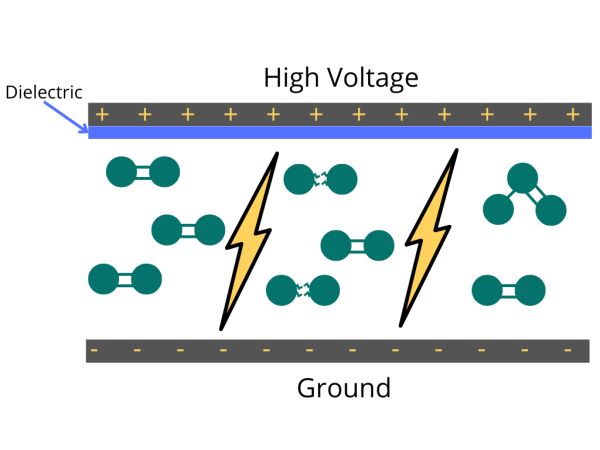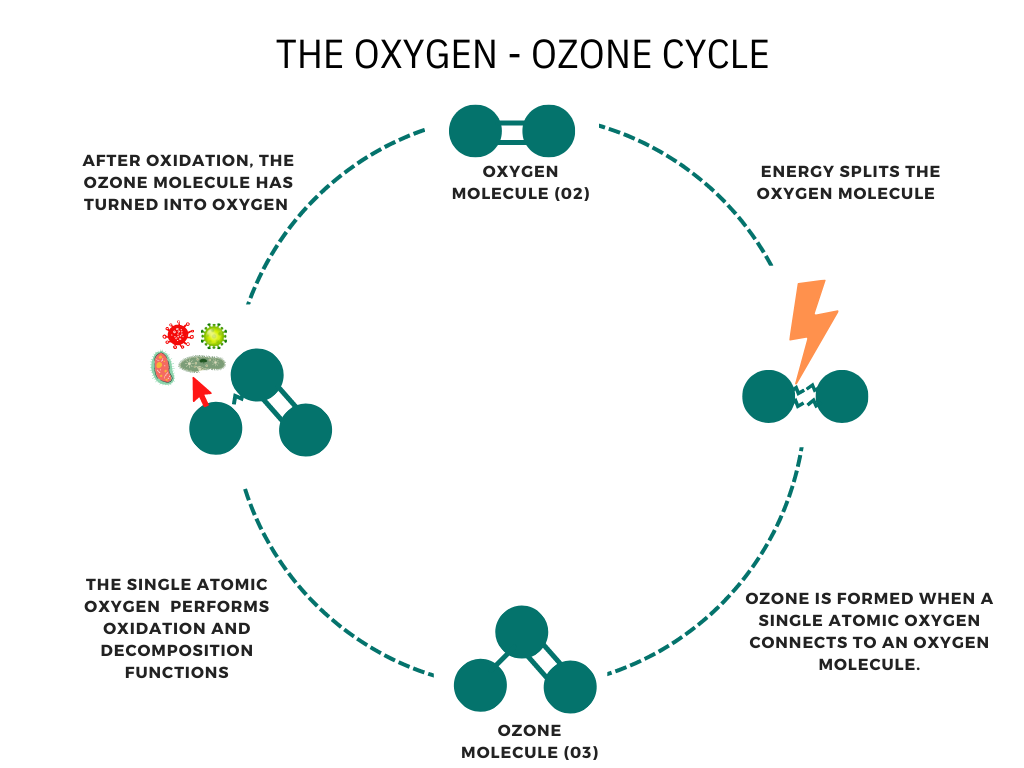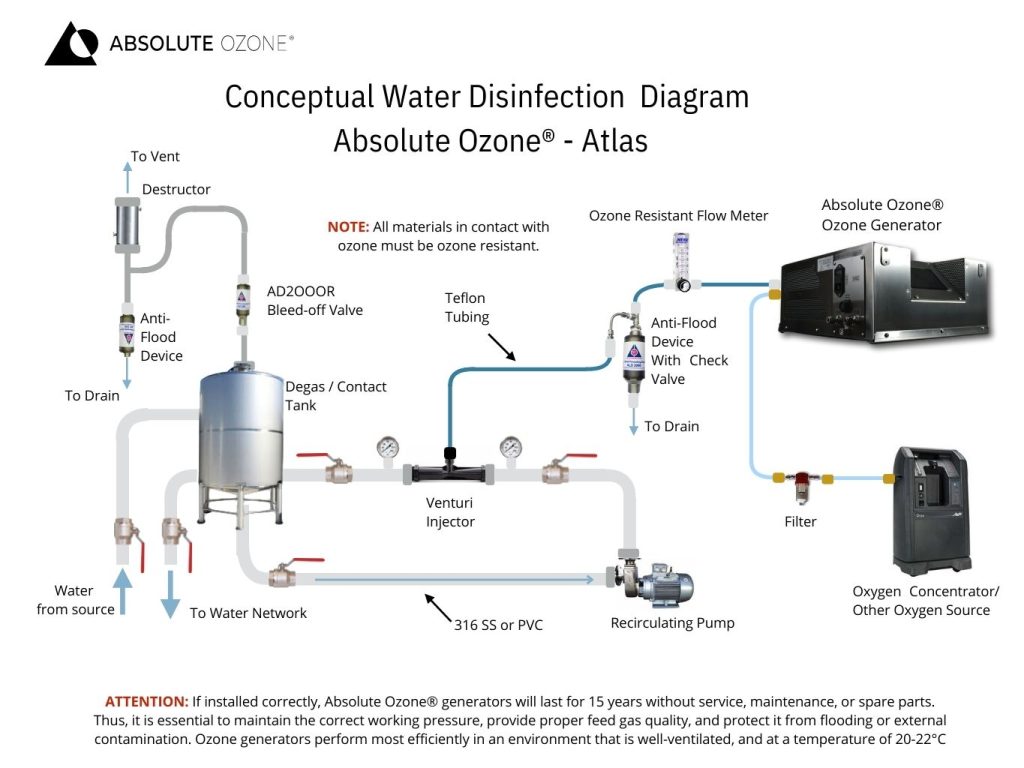Share This Story, Choose Your Platform!
The Process Behind Ozone Water Treatment Systems
“Many industries use ozone water treatment systems to purify and sanitize water. But do you ever wonder how these systems work? Our goal in this post is to explain how ozone is produced and how it is used to eliminate impurities and contaminants from water. Find out how ozone can be used to treat water innovatively and efficiently.”
How ozone is generated
An Ozone generator produces ozone (O3) by applying an electrical charge to the oxygen molecules (O2) passes through, which causes the two oxygen atoms to part ways and temporarily recombine with other oxygen molecules.
Industrially, ozone is primarily generated with cold plasma (also called dielectric barrier discharge or corona discharge). Industrial ozone generators have cells designed to diffuse electrical discharge through a dielectric material to generate ozone.

It is simply a diffused spark through a dielectric to spread out the electrical discharge to a large area. In this method, the electric charge applied to the electrodes causes some oxygen molecules to split apart and temporarily combine with other oxygen molecules making a molecule of three oxygen atoms (O3).
How does ozone work to Disinfect Water?
Ozone water treatment system works by introducing ozone gas into the water, which then oxidizes and breaks down harmful pollutants and organic matter. Ozone is one of the most potent known oxidants. It can be used to burn dissolved compounds (oxidation). The extra oxygen radical in an ozone molecule quickly binds to each component that comes in contact with ozone molecules. This is because of the instability of ozone and its inclination to return to its original form (O2). Ozone instantly reacts with other germs, viruses, and bacteria.

The Benefits of Using Ozone Water Treatment
Water purification with ozone is an effective and efficient method. Water treatment with ozone has the advantages of fast and thorough disinfection, no harmful by-products, flexibility in treating a variety of water sources, improved water quality by reducing unpleasant tastes, smells, and colours, cost-effectiveness through reduced chemical use, and lower operating costs.
The fast and thorough disinfection process
Ozone is a highly reactive gas with powerful oxidizing properties, killing bacteria, viruses, and other microorganisms. Introducing ozone to water reacts with contaminants and breaks down their cellular structure, eliminating them effectively. The result is that ozone disinfects water quickly and thoroughly, removing harmful microorganisms (Ozonation is 3,000 times faster than chlorination in disinfecting water).
No harmful residual by-products
Unlike traditional disinfectants, such as chlorine, ozone breaks down into oxygen after its disinfecting properties have been utilized, leaving no harmful by-products in the water. This makes ozone a safe and environmentally friendly solution for water treatment, providing clean and safe water without the risk of toxic residuals.
Versatility :
In addition to its disinfecting properties, ozone is a versatile solution that can treat various water sources, including municipal, industrial, and agricultural wastewater, Drinking water treatment, hydraulic fracking water, bottled water, vertical farming, etc.
Improved Water Quality:
Another benefit of ozone water treatment is its ability to improve water quality. Ozone effectively reduces unpleasant tastes, odours, and colours in the water, making it more appealing for consumption and use. This makes ozone an effective solution for water treatment in various industries, including the food, laboratory, and beverage industry, where high-quality water is essential for producing safe and high-quality products. Switch to ozone water treatment and enjoy peace of mind with clean and safe water.
What Ozone Water Treatments Remove from Water?
Ozone water treatment systems are designed to remove a wide range of contaminants and pollutants from water, including:
- Microorganisms: Ozone is highly reactive and has powerful oxidizing properties that effectively kill microorganisms such as bacteria, viruses, and fungi. Through oxidation, ozone disrupts the cellular structure of these microorganisms, virtually eliminating them and making the water safe for consumption and use. This makes ozone an effective and efficient solution for disinfecting water in various industries and applications.
- Chemicals: Organic chemicals such as pesticides, herbicides, and industrial solvents can be removed through ozone’s oxidizing properties. When introduced into water, ozone reacts with these contaminants, breaking down their molecular structure and effectively removing them from the water. This makes ozone a highly effective wastewater solution for pharmaceutical and textile industries.
- Inorganic contaminants: Ozone can also remove inorganic pollutants such as heavy metals and minerals from water. This makes ozone an effective solution for eliminating inorganic pollutants, improving the overall quality of the water, and making it safer for consumption and use.
- Colour and odour: Ozone also effectively reduces colour and fragrance in water. In addition to its disinfecting properties, ozone’s ability to reduce shade and odour makes it a versatile solution for water treatment in various industries and applications.
After Ozonization, ozonated water can be safe to drink if it is adequately treated and the ozone levels are within safe limits.
“Does Ozonated Water Provide More Effective Disinfection Than Chlorine?”
Ozone is an effective disinfectant in water treatment systems. Ozone is a highly reactive gas that kills bacteria, viruses, and other microorganisms by breaking down their cellular structure. Ozone is faster than chlorine (Ozonation is 3,000 times faster than chlorination in disinfecting water) and more potent, leaving no residual by-products behind.
Additionally, ozonation can eliminate pesky pathogens such as cryptosporidium. These qualities make ozone a popular choice for water treatment systems, especially in applications where high levels of water purity are required.
DISINFECTION BY-PRODUCT
By-products of disinfection (DBPs) are chemicals that can be formed when chlorine reacts with organic matter. The two most common DBPs in chlorinated drinking water are trihalomethanes (THMs) and Haloacetic acids (HAAs).
There has been evidence linking DBPs to cancer in several studies. The International Agency for Research on Cancer (IARC) has classified the main DBPs as possible human carcinogens. Experts believe that exposure to DBPs over time can cause health concerns. Researchers in Hartford, Connecticut, found that women with breast cancer have 50 to 60% higher amounts of chlorination by-products than women without breast cancer.
Ozone water treatment systems
Ozone gas is partially soluble in the liquid. However, it is possible to reach high mass transfer efficiency using proper methods and equipment. Currently, venturi-based mass transfer systems are the preferred method for dissolving ozone in water due to their simplicity, economy, and effectiveness. The resulting ozone-infused water is then run through a reaction chamber where it comes into contact with contaminants, effectively destroying them, making it a versatile and efficient water treatment solution.

Conclusion: Why Ozone Water Treatment is the Future of Water Disinfection.
In conclusion, ozone water treatment is a cutting-edge solution for water disinfection that offers several benefits over traditional methods. Its fast and thorough disinfection process, versatility in treating various water sources, improved water quality, and lack of harmful residual by-products make ozone water treatment a safe and environmentally friendly solution for water treatment.
Furthermore, ozone water treatment systems are easy to maintain and cost-effective in the long run, providing a sustainable solution for water disinfection. With its numerous advantages, it is no surprise that ozone water treatment is rapidly becoming the future of water disinfection.
Investing in an ozone water treatment system is an intelligent choice for those looking for a safe, efficient, and cost-effective solution for water disinfection. Whether you need to treat municipal, industrial, or agricultural water, ozone water treatment is the solution you have been looking for. So why wait? Choose ozone water treatment today and experience the benefits for yourself!

